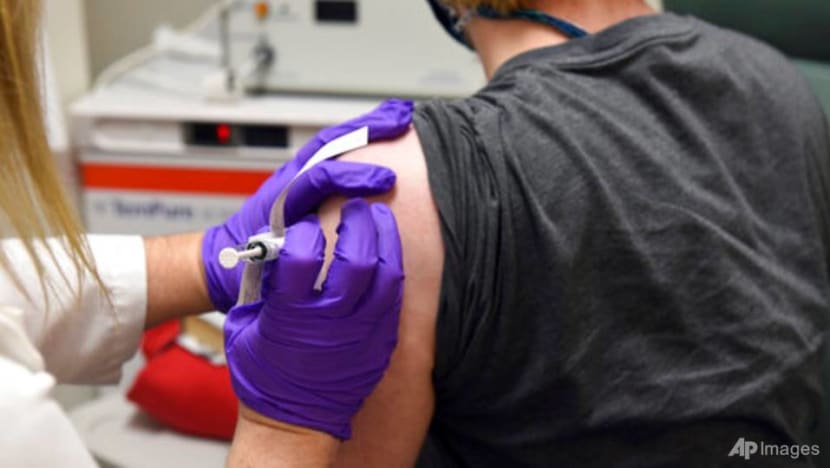Pfizer says early data signals COVID-19 vaccine is 90% effective

The shots made by Pfizer and its German partner BioNTech are among 10 possible vaccine candidates in late-stage testing around the world. (Photo: AP)
NEW YORK: Pfizer said on Monday (Nov 9) its experimental COVID-19 vaccine was more than 90 per cent effective, a major victory in the fight against a pandemic that has killed more than a million people, battered the world's economy and upended daily life.
Pfizer and German partner BioNTech are the first drugmakers to release successful data from a large-scale clinical trial of a COVID-19 vaccine. The companies said they have so far found no serious safety concerns and expect to seek US authorisation this month for emergency use of the vaccine.
If authorised, the number of doses will initially be limited and many questions remain, including how long the vaccine will provide protection. However, the news provides hope that other COVID-19 vaccines in development may also prove effective.
"Today is a great day for science and humanity," said Albert Bourla, Pfizer's chairman and chief executive.
POSITION TO OFFER HOPE
This interim analysis, from an independent data monitoring board, looked at 94 infections recorded so far in a study that has enrolled nearly 44,000 people in the US and five other countries.
Pfizer did not provide any more details about those cases, and cautioned the initial protection rate might change by the time the study ends. Even revealing such early data is highly unusual.
“We’re in a position potentially to be able to offer some hope,” Dr Bill Gruber, Pfizer’s senior vice president of clinical development, told The Associated Press. “We’re very encouraged.”
BioNTech chief executive Ugur Sahin told Reuters he was optimistic the immunisation effect of the vaccine would last for a year although that was not certain yet.
"The efficacy data are really impressive. This is better than most of us anticipated," said William Schaffner, infectious diseases expert at Vanderbilt University School of Medicine, Nashville, Tennessee. "The study isn't completed yet, but nonetheless the data look very solid."
READ: Germany expects COVID-19 vaccine in first quarter 2021 at the earliest
The shots made by Pfizer and BioNTech are among 10 possible vaccine candidates in late-stage testing around the world - four of them so far in huge studies in the US.
Another US company, Moderna, also has said it hopes to be able to file an application with the Food and Drug Administration later this month.
Volunteers in the final-stage studies, and the researchers, do not know who received the real vaccine or a dummy shot. But a week after their second required dose, Pfizer's study began counting the number who developed COVID-19 symptoms and were confirmed to have the coronavirus.
Because the study has not ended, Gruber could not say how many in each group had infections. Doing the math, that would mean almost all the infections counted so far had to have occurred in people who got the dummy shots.
Pfizer does not plan to stop its study until it records 164 infections among all the volunteers, a number that the FDA has agreed is enough to tell how well the vaccine is working. The agency has made clear that any vaccine must be at least 50 per cent effective.
No participant so far has become severely ill, Gruber said. Nor could he provide a breakdown of how many of the infections had occurred in older people, who are at highest risk from COVID-19.
Participants were tested only if they developed symptoms, leaving unanswered whether vaccinated people could get infected but show no symptoms and unknowingly spread the virus.
FDA has required that US vaccine candidates be studied in at least 30,000 people. In addition to adequate numbers of older adults, those studies must also include other groups at high risk, including minorities and people with chronic health problems.
And it told companies they must track half their participants for side effects for at least two months, the time period when problems typically crop up. Pfizer expects to reach that milestone later this month, but said Monday no serious safety concerns have been reported.
READ: Global COVID-19 cases exceed 50 million after 30-day spike
CONCERNS RAISED
Pfizer and BioNTech have a US$1.95 billion contract with the US government to deliver 100 million vaccine doses beginning this year. They have also reached supply agreements with the European Union, the United Kingdom, Canada and Japan.
Because the pandemic is still raging, manufacturers hope to seek permission from governments around the world for emergency use of their vaccines while additional testing continues - allowing them to get to market faster than normal but raising concerns about how much scientists will know about the shots.
The FDA's scientific advisers last month said they worry that allowing emergency use of a COVID-19 vaccine could damage confidence in the shots and make it harder to ever find out how well they really work. Those advisers said it is critical these massive studies are allowed to run to completion.
BOOKMARK THIS: Our comprehensive coverage of the coronavirus outbreak and its developments
Download our app or subscribe to our Telegram channel for the latest updates on the coronavirus outbreak: https://cna.asia/telegram












